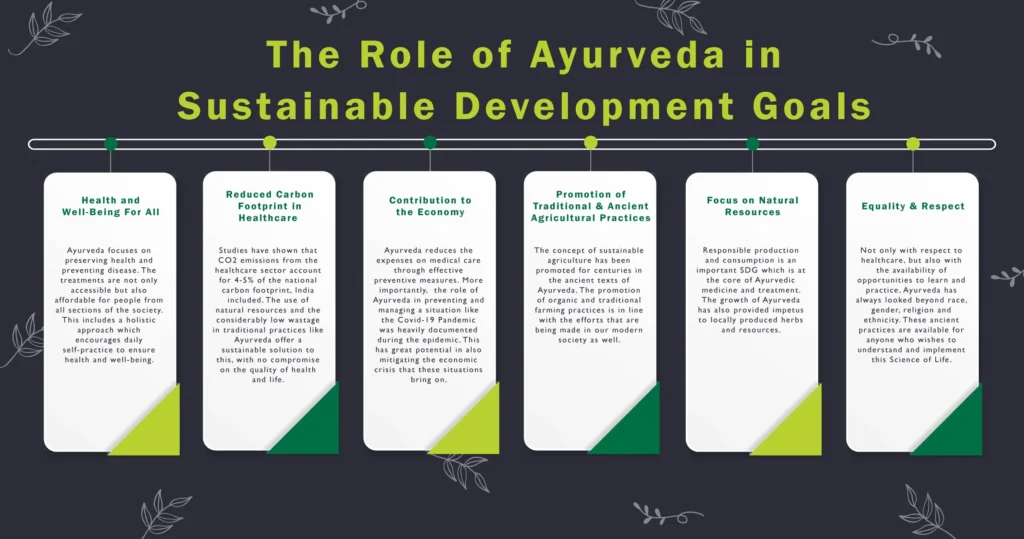As the world grapples with healthcare challenges, Ayurveda emerges as a sustainable, holistic solution that aligns with global objectives like the United Nations Sustainable Development Goals (SDGs). Ayurveda’s emphasis on preventive care, environmental harmony, and holistic well-being positions it as a critical player in achieving sustainable healthcare.
What Are the SDGs?
The United Nations Sustainable Development Goals (SDGs) aim to address global challenges like poverty, inequality, and climate change by 2030. These 17 goals emphasize sustainable practices across various domains, including health, clean water, and environmental protection. Ayurveda contributes significantly to SDG 3: Good Health and Well-being, among others.
How Ayurveda Aligns with SDGs
- Promoting Preventive Healthcare (SDG 3: Good Health and Well-being)
Ayurveda focuses on prevention through diet, lifestyle practices, and natural remedies. For example, Panchakarma therapies help detoxify the body, reducing the burden on healthcare systems. - Biodiversity Conservation (SDG 15: Life on Land)
Ayurvedic formulations rely on natural herbs and plants, emphasizing the conservation of biodiversity. Jeevan Jyoti Ayurveda supports sustainable sourcing practices to preserve medicinal plants for future generations. - Affordable and Inclusive Care (SDG 10: Reduced Inequalities)
Ayurvedic treatments are often cost-effective, making holistic healthcare accessible to diverse populations, including underserved communities. - Sustainable Practices (SDG 12: Responsible Consumption and Production)
The use of natural and biodegradable ingredients in Ayurveda promotes eco-friendly consumption, reducing environmental impact.
Ayurveda’s Role in Holistic Well-being
Ayurveda bridges traditional wisdom with modern healthcare needs by integrating practices like:
- Panchakarma Therapy: Detoxifies the body and promotes rejuvenation.
- Dietary Guidance: Personalized diets based on doshas (Vata, Pitta, Kapha) ensure nutritional balance.
- Yoga and Meditation: Enhances mental and physical health.
These approaches address not only physical ailments but also mental and spiritual well-being, a core principle of SDG 3.
Challenges and the Way Forward
Despite its potential, Ayurveda faces challenges like standardization and research validation. Increased investments in Ayurvedic research and education can help integrate it into global healthcare systems, contributing to sustainable healthcare.

Conclusion
Ayurveda plays a vital role in achieving the SDGs by offering sustainable healthcare solutions, promoting biodiversity, and ensuring holistic well-being. For more insights on Ayurveda’s impact on global health goals, visit Jeevan Jyoti Ayurveda.
For further research, read this study on Ayurveda and sustainable development.

[…] For more information on Ayurvedic practices and their growing importance, check out our post on How Ayurveda Contributes to Sustainable Healthcare. […]